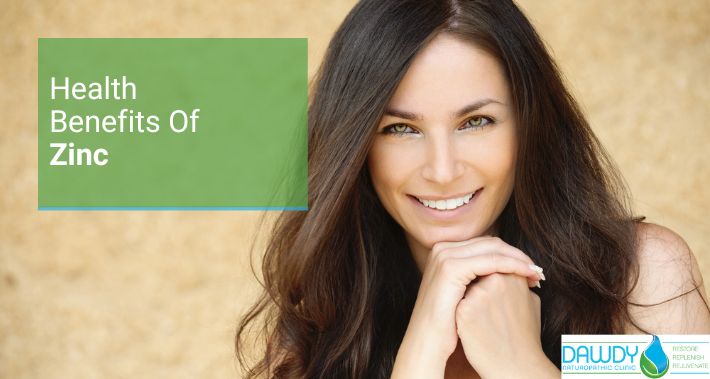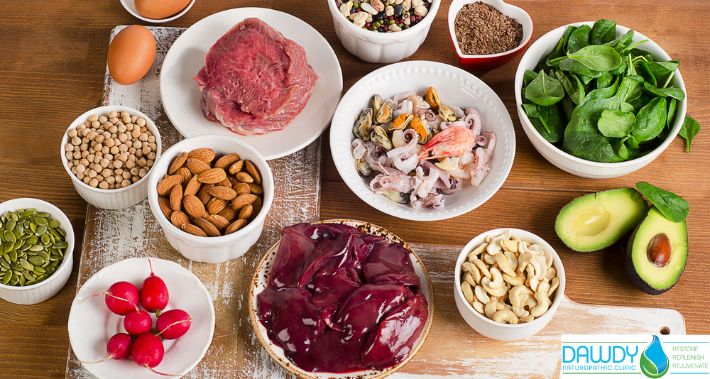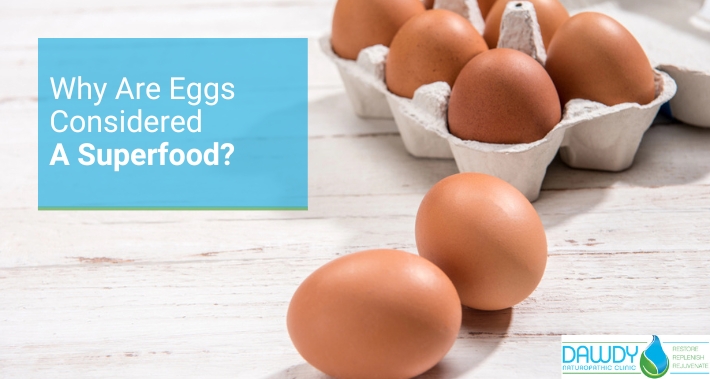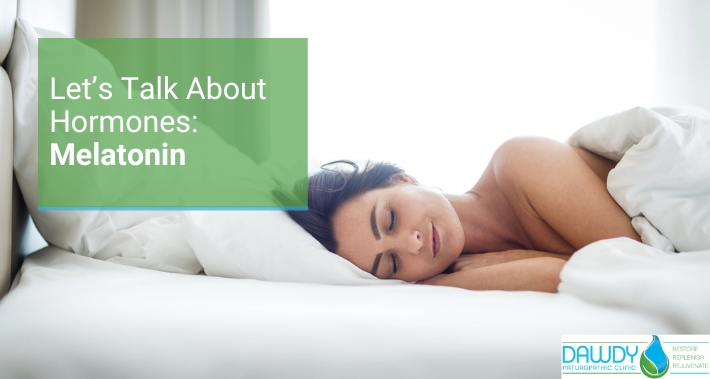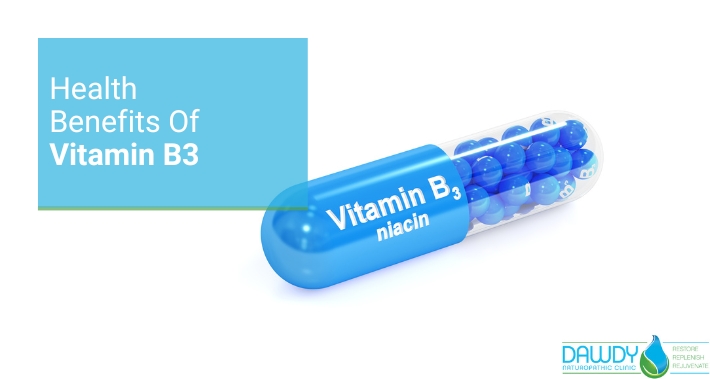Health Benefits of Zinc
Zinc is one of the many essential nutrients that contribute to your overall health.
It’s important for many bodily functions, including skin health, immune function, and cell growth.
This nutrient has health benefits ranging from accelerating wound healing to reducing the risk of age related diseases.
Zinc is not produced naturally in the body, but it’s found naturally in many of the foods you consume.
If you are low on zinc, various health issues could result, such as chronic diarrhea and skin rashes.
Not to worry, though, as naturopathic medicine can help.
I’m Dr. Kimberly, a naturopathic doctor in Ottawa, and in today’s article, we’re talking about zinc.
We’ll take a look at what zinc is, the benefits of zinc, foods with zinc, and what happens if you have too little or too much zinc in your body.
Let’s take a look.
What Is Zinc?
Your body needs nutrients to survive.
Nutrients can be broken down into macronutrients and micronutrients.
Macronutrients are needed by the body in large quantities for you to function.
Think fat, protein, and carbohydrates.
Micronutrients are needed by the body in smaller amounts to perform essential functions.
Despite only being needed in small amounts, they are no less vital for your health than macronutrients.
These include the alphabet soup of vitamins: vitamin A, C, D, E, the B complex, and others.
It also includes minerals, like iron, calcium, and of course, zinc.
In fact, zinc is the second most abundant trace mineral in your body, behind iron.
It’s present throughout every cell in your body.
Zinc plays a major part in:
- The development and functioning of immune cells
- Skin health
- Metabolism
- Digestion
- Nerve function
- DNA synthesis
- Protein production
- Cell growth
- Cell division
- Body growth and development
- Tissue repair
- Taste
- Smell
- Gene expression
- Enzymatic reactions
Therefore, zinc deficiency can cause various health issues.
Your body doesn’t produce its own supply of zinc, which means you need to get it through your diet.
That’s what it means when we say something is an “essential nutrient”.
What Are Zinc’s Benefits?
When your body has enough zinc, it provides a variety of benefits.
Let’s take a closer look at some of them.
1. It’s Good For Your Immune System
Your immune system involves a network of organs, cells, and proteins.
These parts work together to defend your body against infections.
When it comes to your immune system, zinc plays an essential role in keeping it strong.
Zinc helps with cell functioning and cell signaling.
These functions help detect bacteria and viruses you have in your body and defend against them.
Due to this, a deficiency in zinc may lead to a weakened immune system response to infections and colds.
That’s why zinc is often recommended as a way to improve your immune health.
RELATED ARTICLE: 5 Nutrients To Support Your Immune System
2. It’s Good For Your Skin
Acne is a skin condition that results in blemishes and pimples.
It occurs due to a mix of bacteria, inflammation, and oil producing glands.
Acne is often associated with teenagers, but adults can get it as well.
The immune boosting and anti inflammatory properties of zinc can help relieve acne by:
- Reducing the redness involved in pimples
- Reducing inflammation
- Inhibiting the growth of bacteria
- Suppressing oil gland activity
People with acne often have lower levels of zinc in their bodies.
RELATED ARTICLE: How To Manage Acne During Pregnancy
3. It Can Help Manage Inflammation
Free radicals are molecules that are missing an electron.
This makes them more reactive, so they interact easily with other molecules in your body.
Antioxidants can donate electrons to these free radicals, which neutralizes them.
When there is a balance between these two molecules in your body, free radicals fight off pathogens that can lead to infections.
Oxidative stress, on the other hand, occurs when there is an imbalance between antioxidants and free radicals.
This can cause free radicals start to damage your cells in your body.
An abundance of oxidative stress can increase your risk of chronic inflammation, heart disease, cancer, and other chronic conditions.
There are a number of different antioxidants.
Vitamin C is one, and so is curcumin, the active ingredient in turmeric.
Copper, beta-carotene, selenium, and manganese are also antioxidants.
Even melatonin, a hormone that controls your sleep cycle, has antioxidant properties.
RELATED: Naturopathic Doctor For Sleep Problems
Zinc, too, is an antioxidant.
4. It Helps Reduce The Signs Of Aging
Two proteins, collagen and elastin, act to keep your skin looking youthful.
Zinc is involved in the production of these proteins and can help to reduce the risk of age related skin blemishes.
Taking zinc along with regular facial rejuvenation treatments can help keep your skin healthy as you age.
It can not only reduce the risk of age related skin blemishes, but it can also reduce your risk of other age related diseases.
These include:
- Pneumonia
- Age related macular degeneration
- Vision loss
Zinc’s antioxidant properties can help here as well.
5. It Helps Wounds Heal More Quickly
The process of wound healing may sound simple, but it involves a series of complex steps.
To heal a wound, your body must stop the bleeding, reduce inflammation, and stimulate tissue growth.
Collagen is a protein that is involved in this healing process and aids in tissue repair.
Zinc is essential for producing collagen and other proteins that aid in wound healing.
It also aids in immune function and the anti inflammatory response.
For these reasons, your body needs zinc for your wounds to heal.
Fortunately for you, your skin contains about 5% of this zinc that can aid in this healing process.
A deficiency in zinc can reduce your body’s ability to heal, while supplementation can help bring your wound healing back up to the proper levels.
What Foods Are High In Zinc?
If you’re looking to get more zinc in your diet, there are plenty of options to choose from.
In terms of plant based sources, consider:
- Garbanzo beans
- Lentils
- Black beans
- Kidney beans
- Pumpkin seeds
- Hemp seeds
- Cashews
- Oats
- Brown rice
- Mushrooms
- Kale
- Asparagus
- Beet greens
- Peas
Animal sources include:
- Oysters, clams, and mussels
- Crab
- Lobster
- Beef
- Pork
- Lamb
- Turkey
- Chicken
- Dairy products
- Eggs
- Salmon
- Sardines
In general, zinc from animal sources is easier for your body to absorb than plant based sources.
So if you’re a vegetarian or a vegan, it’s important to make sure you’re getting plenty of plant based zinc in your diet.
What Does Zinc Deficiency Look Like?
Severe forms of zinc deficiency are relatively rare here in Canada, but more mild forms are quite common.
You’re at higher risk of zinc deficiency if you’re:
- A vegetarian or vegan
- An older breastfed infant
- Pregnant or breastfeeding
- An alcoholic
- Eating a poor diet
- Taking immune suppressing medications
Conditions such as gastrointestinal diseases, sickle cell anemia, anorexia, bulimia, and kidney disease can also cause an increased risk of zinc deficiency.
The symptoms can be broken down into mild and severe categories.
Mild symptoms include:
- Diarrhea
- Fertility issues
- Impaired wound healing
- Decreased immunity
- Thinning hair
- Impaired taste or smell
- Dry skin
More severe symptoms of zinc deficiency consist of impaired growth, impaired development, delayed sexual maturity, skin rashes, diarrhea, and mood disorders.
Can You Overdose On Zinc?
It’s very difficult to overdose on zinc through diet alone.
But if you’re supplementing, taking too much can cause what’s called zinc toxicity.
This is the opposite of zinc deficiency – you have too much zinc, instead of too little.
In cases of zinc toxicity, you may experience nausea, vomiting, diarrhea, abdominal pain, and headaches.
Zinc toxicity can also impair your body’s absorption of other nutrients.
In particular, it can affect your absorption of iron and copper, which are needed for other bodily functions.
Iron deficiency may affect:
- Muscle function
- Healthy red blood cell count
- Growth and development in kids
- The production of some hormones
RELATED: Pediatric Naturopathic Services In Ottawa
Copper deficiency may affect:
- Bone health
- Body temperature
- White blood cell count
- Heart rate
- Skin pigmentation
- Thyroid health
Book Your Appointment With Dawdy Naturopathic Today
Are you concerned about your zinc levels?
Do you think you might be at risk of zinc deficiency?
If so, I’m Dr. Kimberly Dawdy, ND, and I’m here to help.
Book your appointment with Dawdy Naturopathic today.
Yours in Health,
Dr. Kimberly Dawdy, ND
Dawdy Naturopathic Clinic
6899 Sunset Blvd,
Greely, ON K4P 1C5
-https://g.page/dawdynaturopathicclinic
Dawdy Naturopathic Clinic offers a variety of naturopathic health solutions for individuals and families in Ottawa and the surrounding area.

